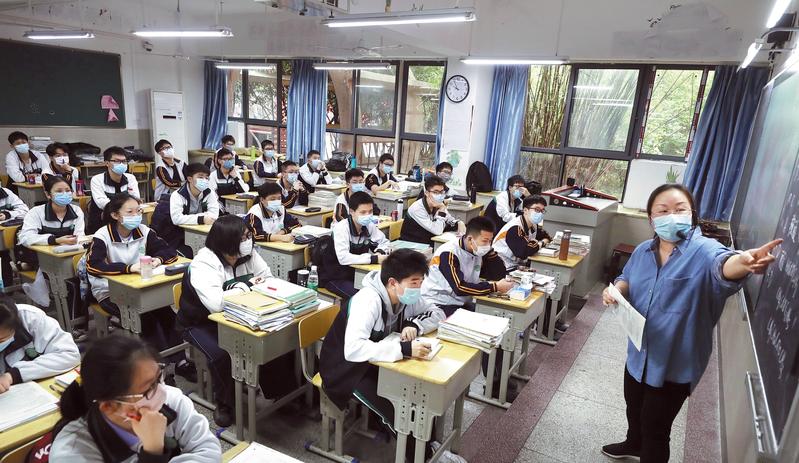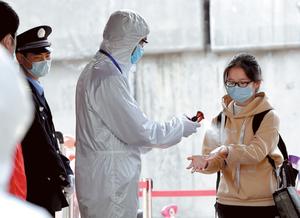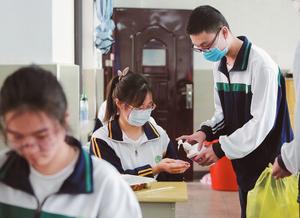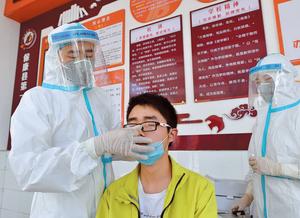Entrants are enduring the tough task of preparing for potentially life-changing exam amid the pandemic
 Senior students at a high school in Wuhan, Hubei province, return to school in May to prepare for the gaokao, the national college entrance exam. Schools in the city were closed as a result of the COVID-19 pandemic. (CHEN XUEZI/ FOR CHINA DAILY)
Senior students at a high school in Wuhan, Hubei province, return to school in May to prepare for the gaokao, the national college entrance exam. Schools in the city were closed as a result of the COVID-19 pandemic. (CHEN XUEZI/ FOR CHINA DAILY)
The gaokao, China's national college entrance exam, is a make-or-break event for millions of students, because the highly competitive and intensive test will largely determine their futures.
Although nearly 90 percent of those who take the exam will be admitted to colleges and universities, only a small proportion can attend the country's leading universities.
Every year, the two top schools, Peking University and Tsinghua University, both in Beijing, admit about 3,000 fresh high school graduates each.
Chinese people often compare the gaokao to "thousands of people crossing a narrow bridge".
That's because for many students, especially those from rural areas, enrollment at a good university is a difficult but worthwhile challenge that could shape the rest of their lives.
The exam caps 12 years of intensive study from primary level to high school. In addition, this year, the entrants face additional pressure as the exam will take place amid the COVID-19 pandemic.
To ensure the students' safety and the fairness of the exam, the gaokao has been postponed for a month, and will now take place on July 7 and 8.
A total of 10.71 million students have signed up to take the exam, a rise of 400,000 from last year, according to the Ministry of Education.
So, how has the pandemic affected the students' preparations? Are they ready to take one of the most important exams of their lives? How do they view the test, and what does it mean to them?
China Daily spoke with four high school students to hear their stories about taking the gaokao amid the pandemic.
 A staff member sprays disinfectant on a senior student's hands before she enters a school in Zhengzhou, Henan province, in April. (LI AN / XINHUA)
A staff member sprays disinfectant on a senior student's hands before she enters a school in Zhengzhou, Henan province, in April. (LI AN / XINHUA)
Wuhan University has always been a dream school for Zhang Yunhan, who was born and raised in Wuhan, capital of Hubei province. The COVID-19 pandemic has reaffirmed her determination to study at the university and she wants to become a teacher at her old high school when she graduates.
"I have witnessed how Wuhan has recovered from the worst public health crisis in my lifetime and I want to make my contribution to the city by nurturing future talent," the 18-year-old said.
Time is a luxury for every final year high school student in China, as they want to spend every waking moment preparing for the gaokao.
Zhang is no exception. In February, her school, Wuhan High School, was closed due to the pandemic and all classes were moved online.
"I do not have time to start panicking about the pandemic as it has not changed the fact that the gaokao remains the top priority for me," she said.
During the lockdown, she got up at about 6 am, took online courses for the whole day and spent her evenings doing mock exams or reviewing what she had learned during the day. At about 11 pm, she went to bed.
The only period of relaxation was when she spent an hour after 10 pm doing physical exercises, reading non-gaokao-related books and playing with her cellphone.
"In a way, the preparation for the exam distracted me from the pandemic and as long as I focused on studying, it became less scary," she said.
Despite that, she still understood the seriousness of the situation because her mother became a community volunteer, delivering medication to people under lockdown who had chronic diseases.
"She came home very late and she always reminded me to take good care of myself when she left in the morning," Zhang said.
"I worried about her safety a lot, but I knew she was doing something honorable so I just prayed that she would not contract the disease."
Zhang went back to school on May 6 as the pandemic waned in Wuhan and the authorities allowed final year high school students to return to classes.
"I was very happy to see my classmates and teachers. Although each class has been divided into two smaller ones and it is uncomfortable to wear a face mask during lessons, I still cherish my remaining days at high school," she said.
She is maintaining her busy schedule as the exam approaches. She feels nervous about the exam, and at the same time she constantly reminds herself to relax and calm down, she said.
"The gaokao is like a major hurdle that we all need to deal with. As long as I work very hard before the exam, it will become less intimidating and I will get better scores," she added.
"I have to make every effort for the exam and whatever the result, I will have no regrets."
 Students use sanitiser to clean their hands before taking lunch at a school in Wuhan in May. (CHEN XUEZI / FOR CHINA DAILY)
Students use sanitiser to clean their hands before taking lunch at a school in Wuhan in May. (CHEN XUEZI / FOR CHINA DAILY)
Sun Feixue was in Beijing when the COVID-19 pandemic hit her hometown of Wuhan in late December. She was there to prepare for an interview at the Communication University of China that had originally been scheduled for March.
Sun-who wants to major in drama and screenwriting-and her grandmother rented an apartment in the capital to prepare for the interview.
As the pandemic worsened in Wuhan, Sun became very anxious, she said.
On Jan 23, Wuhan was put under lockdown to curb the spread of the novel coronavirus. That meant Sun and her grandmother could not return home.
"Although I was scared, I had to make myself adjust quickly to the new situation as the gaokao was approaching. I did not have time for anxiety or other negative feelings," she said.
The university later announced that it would cancel the interviews due to the pandemic, but the lockdown in Wuhan meant Sun and her grandmother were stranded in the capital.
Sun's mother is a nurse at a Wuhan hospital, and she was taking care of patients infected with the coronavirus.
"We would talk via cellphone every night-me reminding her to stay safe and take the necessary precautions at work and her reminding me to take care of myself and work hard for the gaokao," Sun said.
She and her grandmother returned home in mid-April after the lockdown was lifted on April 8.
"The city was very different from when I left in December. Although the lockdown had been lifted, everyone was still wearing face masks and the streets were a lot quieter than before," she recalled.
After Sun returned home, her entire life was concentrated on the gaokao. She got up at 6:30 am and went to bed after 11 pm, having spent the whole day studying.
She returned to school on May 6. Seeing all her classmates working hard for the big exam reminded her that she had to work even harder and not waste any time in the final days, she said.
"Both the pandemic and the gaokao are major challenges for students like me. Challenges are not all bad as they make you stronger," she said. "Spending so much time studying every day is very tiring, but I think I will cherish the experience because it marks the entry to adulthood."
 A medical worker takes a swab from a high school senior for a nucleic acid test in May in Xiangyang, Hubei province. (YANG TAO / FOR CHINA DAILY)
A medical worker takes a swab from a high school senior for a nucleic acid test in May in Xiangyang, Hubei province. (YANG TAO / FOR CHINA DAILY)
During the height of the COVI D-1 9 outbreak, Tang Yulin, from Huaihua, Hunan province, spent most of his time alone, taking online courses at home.
His father was one of more than 42,000 medical professionals who traveled to Hubei to assist in the fight against the coronavirus.
His mother is a nurse at a local hospital.
Tang took six online courses every day and spent the rest of the time studying on his own. He usually rose at 6:30 am and went to bed at about midnight.
"I did feel worried about my father, but I was also proud of him for risking his life to save others," he said.
The outbreak seemed to pass without Tang noticing, because he seldom left home and spent most of his time studying, he said.
His father returned home in early April as the situation in Hubei had improved greatly.
Tang's school reopened on April 7 as the outbreak eased in Huaihua. He said he is happy the gaokao has been delayed for a month because it provides extra time for preparation.
"The time I spent alone at home has made me more self-disciplined. As soon as I start studying, I seldom lose concentration and my grades are getting better," he said.
To further improve his grades, he started taking classes with Zhangmen, a provider of online tutorials for students from kindergarten through 12th grade, when he got home from school every day.
"Preparing for the gaokao is not easy-just as it is not easy for my parents trying to save patients," he said. "What I have learned from the experience is that once you put your mind to something, you will make gains."
Tang wants to become a flight attendant in the future as he has never been in a plane, he said.
"Whether I get good results in the gaokao or not, I am more determined and confident to fulfill my dreams," he added.
As Zhang Yuheng started taking online courses at home in February, the experience was so unpleasant that he almost gave up preparing for the gaokao.
The app for the online courses used by his school often had bugs. Moreover, it only had voice recordings, not images of the teacher.
"As such, I often lost interest in the courses and started drifting off during class as there was no teacher there to supervise me," he said.
He knew that if he did not make a change, his chances of getting into a good university would be very small because his home province of Henan has the largest number of participants in the gaokao due to its large population.
During a mock exam in February, he scored less than 300 points out of a possible 750. If that performance were repeated in the gaokao, he would be unlikely to gain admittance to any university.
After consulting his parents, Zhang Yuheng started one-on-one tutoring courses with an online education provider.
The online classes started at 8 am and ended at 9 pm every day, and with teachers there to answer his questions, his grades gradually improved.
After his school reopened in early April, he worked even harder, getting up at 5:30 am and going to bed after 11 pm.
He continues to use the online courses, and he takes a one-hour class when he returns home at 10 pm to review what he has learned at school.
"Some of my classmates stay up studying till 1 or 2 am, and although I can't stay up that late, I am giving it my best shot," he said.
"It would be very disappointing if I did not get good results in the gaokao, but at least I would have tried my best."


